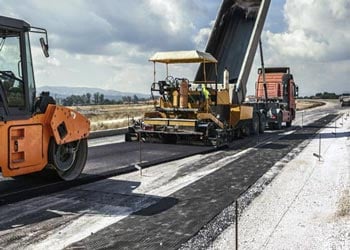
Did you know asphalt is the most commonly recycled material in the United States? By recycling asphalt, our Southeastern MI asphalt contractors can reduce our environmental impact and cut costs for clients.
In fact, recycling asphalt saves more than 60 million cubic yards of landfill space, according to the .
Here’s why asphalt recycling matters for both you and our company.
Why Use Recycled Asphalt?
Recycling is becoming a more important issue on the agendas of world leaders. Many global warming concerns have emerged over the past few decades, warning against irreversible climate change.
Recycling is necessary to use nature’s resources more efficiently and respectfully. The construction industry, just like every other industry, has a duty to use our materials, like asphalt, in a way that protects the environment as much as possible.
In areas where construction or renovation is minor, the impact on local landfills and other solid waste facilities is often major. That’s why we use recycled asphalt as much as possible.
Is Asphalt Environmentally Friendly?
Construction material recycling, such as asphalt recycling, is critical to reducing the total quantity of the waste stream. In fact, more asphalt from roadways is recycled than concrete.
Since we rely on our roads to get from Point A to Point B, it’s important to keep them in good shape. This means we must have a sufficient supply of asphalt paving materials. Asphalt recycling helps fulfill this need.
Some environmentalists suspect that asphalt is a bad paving choice due to its petroleum content. However, we have found that it is easy to recycle, making it much more environmentally friendly. Using recycled asphalt pavement reduces the amount of new material required and saves the energy that would’ve been used to transport them.
Has Asphalt Always Been Environmentally Friendly?
Unfortunately, no. Like many other industries, asphalt plants weren’t always as eco-friendly as they could have been. However, the industry has benefited immensely from the air pollution standards set by the Environmental Protection Agency (APA).
Today, asphalt plants follow the EPA’s standards as well as their own stricter set of rules to reduce air pollution. We’re proud that asphalt production is no longer listed as a major contributor to air pollution by the EPA.
How Is Asphalt Recycled?
In hot-mix asphalt plants, the raw materials in asphalt pavement are usually obtained through crushing. Asphalt shingles can also be ground and recycled into hot-mix asphalt.
Recycled asphalt is then mixed with virgin asphalt to create an aggregate paving material. Our asphalt contractors often use recycled asphalt mixtures for parking lots, driveways, roads, and other paved surfaces. It’s just as durable and long-lasting as virgin asphalt, which makes it perfect for any project.
Is Recycled Asphalt Cheaper?
Yes. Our asphalt contractors can save money for our clients by using recycled asphalt instead of virgin asphalt. Today, the average cost of new asphalt is anywhere from $100 to $200 per ton, but the is only between $7 to $60 per ton.
Save Money and the Environment with Recycled Asphalt
By using recycled asphalt, our asphalt contractors in Southeastern MI can do their best for the environment and save you money without sacrificing the quality of your asphalt surface. To request a free estimate on asphalt paving, call Allied Construction at any of our Clarkston, Brighton/Howell, Milford, or Lapeer, MI, locations.
This blog post has been updated.